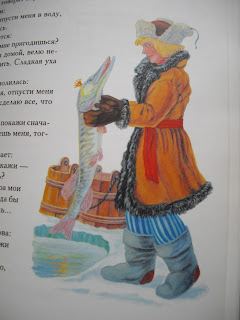Animals possess not only very consistent character traits, but often standard genders and names too. They are always referred to as either male or female characters, never an “it.” Bear is big, bulky, and not particular bright. While he is certainly frightening, he can be tricked and bargained with. He is typically named Misha, the Medved (medved means bear) – and yes, that’s the last name of the current president of the Russian Federation
Interestingly enough, the talking animals in the tales behave as real animals – carnivorous animals (and humans) still eat meat, even when the meat in question can talk. “I’m gonna eat you,” Wolf says to Hare, who usually yaps long enough to talk his way out. Man bargains with Misha, the Medved, “Don’t hurt me – I’ll give you the top half of my harvest” – and hands the beast the turnip leaves while keeping the roots for himself.
Just about every animal’s personality is beautifully revealed in the famous folk tale Teremok, which doesn’t exactly translate as House, but rather a special kind of a fancy building akin to a palace. Discovering the big comfortable space, various animals move in one by one, forming a happy co-op menagerie until one day there comes a troublemaker who can’t play by the rules, ruins the peace and destroys the edifice.
So, tell me, which animals are part of your national folklore, and what adventures do they bring to your people?


Fabulous post, Lina! And remarkable, a lot of this applies to Indian folklore as well. There are famous anthologies of children's fables known as Panchantantra in India (http://en.wikipedia.org/wiki/Panchatantra). They feature "talking" animals and a heavy dose of morality. My kids always receive these books as gifts whenever we visit, but I've never been able to get into them myself, even as a kid. I think it was because their agenda was too obvious: "be good." ;)
ReplyDeleteWell, believe it or not, some of the Russian fables aren't the "be good" fables. The fish one - the one in the picture, is about a very lazy man who is lucky to catch a fish that filfills his every wish - until he finally weds the tsar's daughter. And he doesn't get any less lazy in the process! I think the underlying theme here is wishfull thinking... LOL!
ReplyDeleteI didn;t know that the Russian president's name was derived from "bear". Howe interesting! Does the ending "ev" in Russian names have a specific meaning?
ReplyDelete